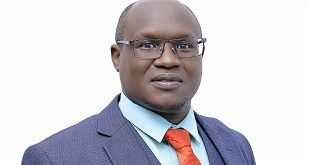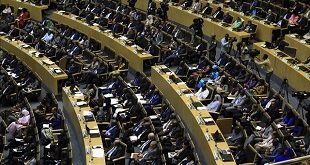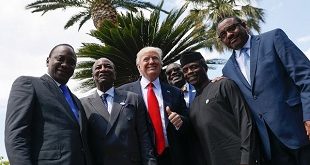
By Agather Atuhaire
Why Besigye has its vote, Muntu its heart
Weeks after Uganda’s main opposition party voted retired Col. Dr. Kizza Besigye to be its flag-bearer in the 2016 presidential elections, members remain divided over the likely implications of the decision. Within the FDC, The Independent has been told, Besigye’s win came as a surprise to the camp of party president Mugisha Muntu. According to a source, a survey that was done before the elections showed that Muntu was ahead of Besigye. Muntu reportedly had more supporters in the National Executive Committee (NEC), which is the executive organ of the party, and he also had over 30 of the 38 MPs on his side.
But when the elections were held and votes counted on Sept. 02 at the Mandela National Stadium in Kampala, Besigye polled 718 votes against Muntu’s 289.

Muntu put a brave face on it, but insiders say his camp is devastated.
“Right now Muntu’s supporters are disoriented; they know 2016 will be the same story like in the last three elections,” a member of the party’s top leadership told The Independent on condition of anonymity. That was in reference to the three times Besigye has contested the presidential elections and lost.
“The general feeling in the party right now especially among those who supported Muntu is that, that’s another five years gone. Because although Besigye has the popular support, he doesn’t have any plan as far as 2016 is concerned,” the source said.
According to this source, the flogged argument that Besigye cannot win over any more supporters from other parties particularly the NRM because of his extremist tendencies has again gained currency.
The argument is that with Muntu as flag-bearer, the party would have counted on the support of many within the ruling NRM party of President YoweriMuseveni and the government who think they are safer with Muntu as the next president than Besigye.
“There is a lot of doubt that Besigye can take power even if he won because of his lack of plan,” the source said.
Muntu strategy backfires
But among the FDC foot soldiers, the feeling is possibly different.
Days before Nicholas Atuhairwe, an FDC delegate from Isingiro District left his home to vote for the party flag bearer, he told The Independent that he received clear instructions from a group of his supporters. You must vote Kiiza Besigye, they ordered him.
“Most of us had no choice but to obey the voice of the people,” Atuhairwe, who had previously confessed to facing a dilemma over who to vote because of his admiration for the two men.
While Besigye has over the years acquired a near-god status amongst party faithfuls, Muntu and his supporters put up a major fight throughout the campaigns that to some, at some point it appeared as if the battle between the two men could go either way.
Now it appears according to Atuhairwe that Muntu’s campaign strategy might have worked against him. Muntu was unusually aggressive during the campaign. And he also used money.
“The issue of money compromised Muntu,” Atuhairwe says, “ Most delegates started becoming suspicious when Muntu started dishing out money, because everyone started asking themselves where Muntu, who for three years had struggled to raise money for supporting the party, had gotten the money to dish out to delegates.”
He added that Muntu’s team was also radical and abusive. “The delegates did not find that analogy of Moses and Joshua funny,” Atuhiarwe says, “It was as if they were saying Besigye has been useless all this while.”
Apart from this, Atuhairwe claims the delegates felt that Muntu was not as committed as Besigye to pushing for electoral reforms as he insisted that he will be on the ballot paper, with or without reforms.
As Atuhairwe raises these issues, many Muntu supporters also have almost similar issues with Besigye and his team.
Once outspoken Kitgum District Woman MP Beatrice Anywar used to be a strong Besigye supporter but she appears to have switched to Muntu.
She told The Independent that Besigye’s team has no moral authority to talk about aggressiveness and abusiveness because they had for a long time been involved in a campaign to damage Muntu’s image.
She says they have spread propaganda that Muntu is a mole of the ruling NRM party which she is certain contributed to his defeat.
She said the talk before the elections that Muntu’s camp was giving money and accommodation to delegates was malicious arguing that every contestant has at one point or the other given money to contestants.
“Yes, that is ideally the job of the party but the moment you are a contestant you must know that the voters have some expectations,” she told The Independent,“I have even housed delegates in my house before, because they come to you and you can’t chase them.”
She says both teams distributed money to delegates only that Muntu’s team did not treat it as a big issue since it always happens. And she says that Muntu’s loss had nothing to do with how he campaigned or what his team did or said.
“The delegates’ choice was informed by many issues that had nothing to do with what happened in Namboole,” she said. In fact, she says it had little to do with the two men but was about the main goal of the party and who seemed best suited to achieve it.
“Our sole objective is getting power; that’s the objective of the supporters of Muntu and that’s the objective of those who supported Besigye,” she said, “When you consider that, and consider the person we are fighting against, President Museveni, you will understand why the delegates chose the person they did.”
She says people look at Muntu as a soft democrat who can only be effective in an ideal situation where people follow the law to the latter.
But in a case like Uganda, Anywar says, people think that a defiant, belligerent character like Besigye can measure up to the militaristic Museveni.
“So when Besigye goes to the streets and pulls crowds,” she says “crowds that might not even be necessarily concerned with the same cause as his, the voters will think that he is the right man to defeat Museveni.”
Besigye’s crowd effect
For that reason, Anywar says the delegates had to choose Besigye considering the crowds he attracted during the two months that the two candidates traversed the country.
Renowned lawyer and FDC delegate WanderaOgalo agrees with Anywar. He says that the crowds that were shown on TV stations and newspapers at Besigye’s rallies during campaigns convinced the delegates that he can defeat Museveni.
“Besigye managed his campaigns by focusing on non-voters but all Ugandans which made the delegates believe that he can indeed rally Ugandans behind him,”Ogalo says, “Muntu’s strategy on the other hand is to organise and strengthen party structures so that the party is supported by structures not individuals.” “But as a result of that, he didn’t give himself time to sell his personality and he was out of the public eye.”
Ogalo says Muntu’s strategy did not seem to appeal to the delegates.
“They preferred the strategy which is about building an individual but not the strategy to build the party,” he says.
But other party members say Muntu has simply not worked hard enough to win the trust and confidence of the delegates. They say it is a failure in itself for Muntu to fail to sell his approach and strategy to the party members for the three years he has been at the top.
“Muntu has failed to sell his ideology to the members of his party,” said Gilbert Asiimwe, another FDC member, “yet he has also failed to lure his sympathisers outside of FDC into the party. It was incumbent upon him as President to bring all the fence-sitters into the party.”
All these divergent views are what observers see as underlying divisions that might disadvantage the party ahead of the 2016elections. They are added baggage to a party that has yet to fully recover from the damaging polls of 2012 where Muntu beat the current Secretary General Nandala Mafabi for party President. This conflict gave birth to two factions in the party; the radicals who are also termed as the “Besigyeists” and the Muntu democrats.
Mbabazi benefits
Former Vice President Western region AmanyaMushega is possibly a `Muntuist’. From the start he has not seemed happy with Besigye’s decision to contest for the party flag again. There are indications that many other party members, like Mushega, are jittery about Besigye’s intentions.
Partly it is because Besigye, since he resigned abruptly as party president in 2012, said repeatedly that he would not contest again in a presidential election organised while Museveni is still president. He appeared to cement this position when he formed an advocacy group, Citizens Reforms Now (CIREN), to categorically say elections will not change the regime.
His reentry into the race, therefore, appears to be a major flip-flop. But his supporters appear not to be offended.
The bigger question, after Besigye’s Namboole win, appears to be whether The Democratic Alliance (TDA), which he joined recently to push for a joint single candidates against Museveni can forgive his double-speak and choose him.
So far that appears unlikely as many members of TDA appear determined to participate in the 2016 elections. They might not take a chance with Besigye who keeps hinting that “there will be no elections in 2016”.
It is on the basis of these differences in approach just months ahead of the 2016 elections that observers feel despite going through the elections, the party might find itself in trouble.
“AmamaMbabazi will be the main beneficiary in all this,” says Mesharch Katusime, a Senior Lecturer in the department of Leadership and Governance at Makerere University Business School.
“Mbabazi will most likely get Muntu’s supporters. If he adds them to the NRM people who are not happy with the statusquo, he will without a doubt be a very strong candidate.”
The fact that the two contestants and their supporters had totally disparate strategies does not help matters.
There were clear disagreements on the different strategies of the two candidates. During the public debate the two had on Aug.30. While Besigye still insists, even after Parliament passing the Constitutional Amendment Bill that ignored their proposals, that there will be no elections before reforms, Muntu seemed ready to participate in the elections under the current arrangement.
Besigye more than once interrupted Muntu tasking him to clarify if his position on electoral reforms was at variance with that of the joint coalition, The Democratic Alliance (TDA).
But when Muntu was addressing the delegates before the elections, he said Besigye had failed to show what his plan for winning the 2016 election was.
“I am the party leader, If Besigye takes the flag, I will rally the support of the party behind him. But I can tell you we will be moving in the dark, without a clear direction,” Muntu told delegates.
He repeated it when he lost.
In his concession speech after the elections, Muntu still expressed fear of the danger of the party moving in “parallel paths”. He urged Besigye to let the party in on his plans so that the positions can be harmonised. “This is not a loss for me,” he said, “I’m a long distance runner. For every dark cloud there is a silver lining. But we have to harmonise positions. Dr Kizza Besigye, we need to know your plan.”
As they struggle to cope with their new befuddling situations, many party members are grappling for optimism. When asked whether the election campaign created tensions between Besigye and Muntu that will be difficult to erase, many insist there will not be any damaging divisions. Many speak of Muntu’s unifying abilities and how he has proved to be a man who accepts defeat gracefully. “Muntu was mentally prepared for the loss,” says former Leader of Opposition in Parliament OgengaLatigo, “Besides, he has demonstrated before that he can easily rally behind the person he has lost to, to protect the interests of the party.”
Ogalo also says there is no justification for those concerns because this is not the first time Muntu is losing elections within the party.
“I am not even one bit worried about the future of FDC,” he said, “Muntu has been beaten twice before and on both occasions he has thrown his weight behind the person he has lost to. In 2011, he was at every rally with Besigye, yet he had just lost to him a few months before.” Ogalo adds: “Muntu doesn’t carry grudges; he focuses on the bigger picture.”
Anywar also described Muntu as a unifying factor who will not let those disagreements break the party. He said even if his supporters might want to cause chaos, Muntu will prevail on them to ensure that the party moves forward. “Although some haven’t given him the credit he deserves,” she says, “Muntu is a gentleman and he has endeavored to keep our party together.” Indeed, Muntu in his concession speech pledged not the let the elections divert the party from its main focus. He pledged to rally the party behind the chosen flag bearer for the party’s benefit.
“I congratulate Besigye for winning. I respect the choice for the delegates. I have lost but FDC has won. I am a democrat. I don’t fight for positions, I fight for principles and causes. I’m going to swing the Party infrastructure behind him (Besigye). We will succeed”. The most cynical Muntu supporters say it is for this reason that they do not mind Besigye winning. “This is Besigye’s last try,” they say as the shift to their leader, Muntu’s long-distance mode.
 The Independent Uganda: You get the Truth we Pay the Price
The Independent Uganda: You get the Truth we Pay the Price


